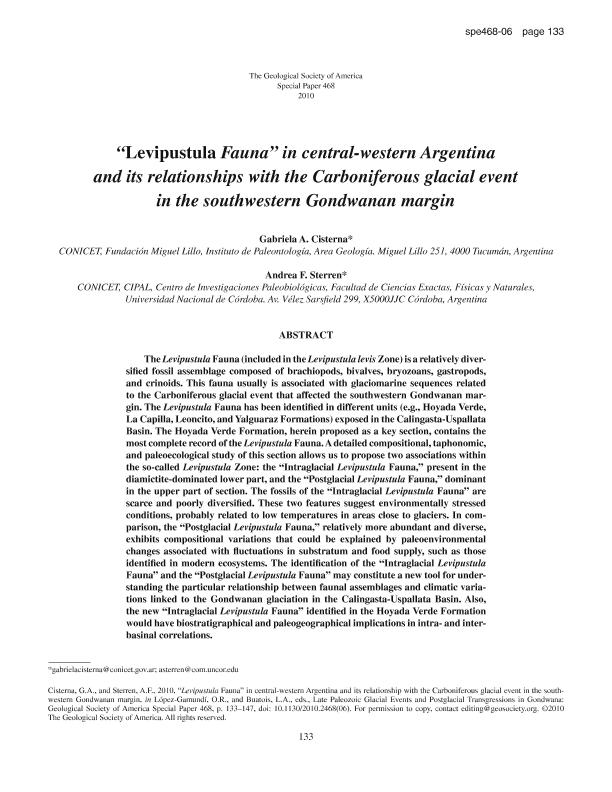Mostrar el registro sencillo del ítem
dc.contributor.author
Cisterna, Gabriela Adriana

dc.contributor.author
Sterren, Andrea Fabiana

dc.date.available
2018-08-09T21:31:08Z
dc.date.issued
2010-08-01
dc.identifier.citation
Cisterna, Gabriela Adriana; Sterren, Andrea Fabiana; "Levipustula Fauna" in central-western Argentina and its relationships with the Carboniferous glacial event in the southwestern Gondwanan margin; Geological Society of America; Special Paper of the Geological Society of America; 468; 1-8-2010; 133-147
dc.identifier.issn
0016-7606
dc.identifier.uri
http://hdl.handle.net/11336/54903
dc.description.abstract
The Levipustula Fauna (included in the Levipustula levis Zone) is a relatively diversified fossil assemblage composed of brachiopods, bivalves, bryozoans, gastropods, and crinoids. This fauna usually is associated with glaciomarine sequences related to the Carboniferous glacial event that affected the southwestern Gondwanan margin. The Levipustula Fauna has been identified in different units (e.g., Hoyada Verde, La Capilla, Leoncito, and Yalguaraz Formations) exposed in the Calingasta-Uspallata Basin. The Hoyada Verde Formation, herein proposed as a key section, contains the most complete record of the Levipustula Fauna. A detailed compositional, taphonomic, and paleoecological study of this section allows us to propose two associations within the so-called Levipustula Zone: the "Intraglacial Levipustula Fauna," present in the diamictite-dominated lower part, and the "Postglacial Levipustula Fauna," dominant in the upper part of section. The fossils of the "Intraglacial Levipustula Fauna" are scarce and poorly diversified. These two features suggest environmentally stressed conditions, probably related to low temperatures in areas close to glaciers. In comparison, the "Postglacial Levipustula Fauna," relatively more abundant and diverse, exhibits compositional variations that could be explained by paleoenvironmental changes associated with fluctuations in substratum and food supply, such as those identified in modern ecosystems. The identification of the "Intraglacial Levipustula Fauna" and the "Postglacial Levipustula Fauna" may constitute a new tool for understanding the particular relationship between faunal assemblages and climatic variations linked to the Gondwanan glaciation in the Calingasta-Uspallata Basin. Also, the new "Intraglacial Levipustula Fauna" identified in the Hoyada Verde Formation would have biostratigraphical and paleogeographical implications in intra-and interbasinal correlations.
dc.format
application/pdf
dc.language.iso
eng
dc.publisher
Geological Society of America

dc.rights
info:eu-repo/semantics/openAccess
dc.rights.uri
https://creativecommons.org/licenses/by-nc-sa/2.5/ar/
dc.subject
Levipustula Fauna
dc.subject
Carboniferous
dc.subject
Glacial Event
dc.subject
Argentina
dc.subject.classification
Meteorología y Ciencias Atmosféricas

dc.subject.classification
Ciencias de la Tierra y relacionadas con el Medio Ambiente

dc.subject.classification
CIENCIAS NATURALES Y EXACTAS

dc.title
"Levipustula Fauna" in central-western Argentina and its relationships with the Carboniferous glacial event in the southwestern Gondwanan margin
dc.type
info:eu-repo/semantics/article
dc.type
info:ar-repo/semantics/artículo
dc.type
info:eu-repo/semantics/publishedVersion
dc.date.updated
2018-08-02T15:30:39Z
dc.journal.volume
468
dc.journal.pagination
133-147
dc.journal.pais
Estados Unidos

dc.journal.ciudad
Nueva York
dc.description.fil
Fil: Cisterna, Gabriela Adriana. Consejo Nacional de Investigaciones Científicas y Técnicas; Argentina. Fundación Miguel Lillo; Argentina
dc.description.fil
Fil: Sterren, Andrea Fabiana. Consejo Nacional de Investigaciones Científicas y Técnicas; Argentina. Universidad Nacional de Córdoba. Facultad de Ciencias Exactas Físicas y Naturales. Centro de Investigaciones Paleobiológicas; Argentina
dc.journal.title
Special Paper of the Geological Society of America

dc.relation.alternativeid
info:eu-repo/semantics/altIdentifier/url/https://pubs.geoscienceworld.org/books/book/622/chapter/3805392/
dc.relation.alternativeid
info:eu-repo/semantics/altIdentifier/doi/http://dx.doi.org/10.1130/2010.2468(06)
Archivos asociados
